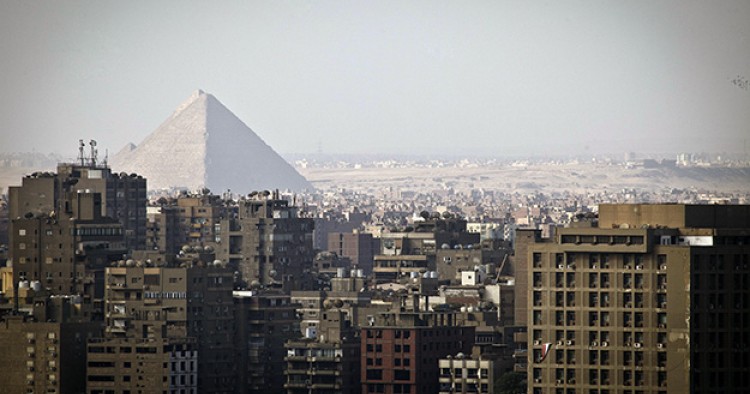Egypt’s Economic Development Conference will be held in Sharm el-Sheikh March 13-15, 2015. The conference aims to lay out the Egyptian government’s economic vision and plans for reform and position Egypt as a desirable destination for international investment. We spoke with Hoda Selim, an economist at Egypt’s Economic Research Forum, about the country’s current economic position and how the conference could help.
Where does Egypt currently find itself economically?
Following the 2011 uprising, Egypt managed to escape recession, but annual growth has dropped to about 2 percent, down from an average of 5 percent in previous years. Average annual employment growth was around 3 percent before 2011 but fell to a low of -0.2 percent between 2011 and 2013. Similarly, unemployment has been on the rise since 2011, with estimates for the 2013 fiscal year showing that it has surpassed 13 percent, in comparison to some 9 percent before the uprising. Since January 2011, the fiscal deficit has risen to close to 13 percent of GDP (from 8 percent of GDP in FY10), and domestic debt has risen to above 80 percent (from 60 percent of GDP in FY10).
Yet Egypt’s finances have largely stabilized thanks to capital flows from the Gulf countries, and some signs of an economic rebound were evident in early 2015.[1] The Egyptian government is aiming for growth of up to 5.8 percent over the next three years.
What role will the Gulf countries play in Egypt’s economic future?
Egypt is a strategic ally and anchor of stability for both Saudi Arabia and the UAE, and there is high-level political interest in and commitment to pursuing and strengthening bilateral economic relations. Both Saudi Arabia and the Emirates affirmed Egypt’s political position by providing financial support after June 2013. I think both will be key players in the medium term. I hope that their support will be seen in long-term job creating investments and in facilitating migration of Egyptian workers to GCC markets, rather than only providing short-term support. Simply aiding the deficit will delay the implementation of required measures—such as an exchange rate devaluation to stop the depletion of foreign reserves—that Egyptian policymakers should undertake to correct the existing market distortions.
What are the main economic policy decisions that the Egyptian government has made over the last year and a half?
The government has been addressing energy subsidies and in 2014 imposed ascending taxes to curb the fiscal deficit. Subsidy reforms should bring energy prices closer to cost recovery levels by raising the prices of gasoline, diesel, and natural gas prices for consumers and some industries. Electricity prices have also been raised for both commercial and residential use with the aim of eliminating power subsidies by 2018. The recent downward trend in global energy prices provides a favorable environment for these policies. Other tax reforms include an increase in taxes on cigarettes and alcohol; the introduction of a three-year, 5 percent “wealth” tax on individuals whose annual income exceeds US$140,000; the introduction of a 10 percent tax on capital gains and dividends of companies listed on the local stock market; and the introduction of a 10 percent tax on profits from investment in securities abroad. More recently, there have been announcements that the Ministry of Finance is reverting to a flat tax rate of 22.5 percent. The cabinet has also approved changes to two laws: the Investment Law and the Special Economic Zones Law, both of which facilitate foreign direct investment and job creation. These changes demonstrate Egypt’s new economic direction, which aims to increase investor protection.
What is the significance of the Egypt Economic Development Conference (EEDC)?
The conference is an important marketing vehicle for Egypt. It should act as a positive signal to investors that Egypt is a promising investment haven. While effective communication about economic plans and reforms has never been the Egyptian government’s strong point, one objective of the conference is to “detail the government’s economic vision and midterm reform program.”[2] This may lay the groundwork for foreign investors to obtain more information needed to establish their businesses.
What are the conditions for the success of the EEDC?
The success of the conference hinges on two major factors. The first is political stability and the restoration of security. Cairo and other governorates are subject to security incidents several times a week, and this is a significant worry for foreign investors. The continued delay in parliamentary elections may also signal further political instability, with implications for sovereign risk. Another factor is the foreign currency shortage. The private sector has been facing difficulties in obtaining foreign currency for international transactions and has thus been consistently resorting to the black market. This shortage reflects a drop in Egypt’s foreign exchange earnings—mainly from tourism and exports. While these issues must be addressed, it is equally important for the government to boldly lay out the future direction of its economic policy in order to attract sufficient support for it.
The Middle East Institute (MEI) is an independent, non-partisan, non-for-profit, educational organization. It does not engage in advocacy and its scholars’ opinions are their own. MEI welcomes financial donations, but retains sole editorial control over its work and its publications reflect only the authors’ views. For a listing of MEI donors, please click here.












